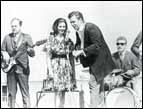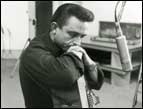A Heart of Darkness That Found the Light
CBN.com - It wasn’t supposed to be this way. Twelve year old Jack Cash, the oldest of Ray and Carrie Cash’s three children was to be a preacher, a man of letters, God’s servant of truth. Yet on a fateful day in 1944, he bled to death in a grisly saw mill accident. His mother was devastated with grief, but his father had a different response. He blamed Jack’s 10 year old brother John; going on to say that he was the one who was supposed to die.
Imagine the guilt young John must have felt. Take a moment to grasp the emotional pain he must have carried with him for years. Consider the torment that must have chased him into his adult years. How could God allow his father to utter such ridicule? Jack was his hero. Johnny Cash had no clear answer as to why.
This is an early scene from Walk the Line, a new major motion picture starring Joaquin Phoenix and Reese Witherspoon that opened over the weekend. Focusing on the early career of Cash, the musical biopic delves deeply into the emotional demons that drove the self-proclaimed Man in Black.
It is widely thought that Cash straddled a fine line between heaven and hell due in large part to his father’s scorn toward him. And while the film only glosses over the religious convictions that fueled his inner battles, movie goers can easily see what molded and shaped this American icon.
“It’s not like John’s path is one you would recommend to somebody but he knew what sin was,” explains Walk the Line Director James Mangold, who also co-wrote the script under Cash’s supervision. “And he knew what mistakes felt like. And he knew what it was to forgive. Part of the reason is because of faith. The part of John’s life we are telling the story about is the part where he pushed God away and really where God started coming back to him as did belief, and love, and life, and living, and art …”
As Johnny Cash’s fame grew so did his dependency on amphetamines and pain killers. Initially, he used them to chase away road fatigue, the result of spending up to 300 days a year on the road. But the drugs eventually became an addiction, threatening to tear apart a burgeoning career whose origins were deeply rooted in gospel. Fortunately, Cash’s saving grace came in the form of June Carter and her extended family.
addiction, threatening to tear apart a burgeoning career whose origins were deeply rooted in gospel. Fortunately, Cash’s saving grace came in the form of June Carter and her extended family.
Reese Witherspoon, who portrays June Carter in Walk the Line says, “I think June brought a lot of Christianity into his life, and encouraged him to go to church, and to find God. I think spirituality had a lot to do with him getting off drugs. I don’t think it’s in the movie as much, but I gather that had a lot to do with it.”
Joaquin Phoenix, who plays Cash in the film, is quick to point out that while June Carter and faith in God had a lot to do with his transformation; Cash was unable to come clean from drug dependency overnight.
“… I don’t think everything turned around for him and everything was better and his life changed forever. It was an ongoing process. He continued to fight his addiction which he was very open about throughout his life. There was a turning point for him and all of these different forces came together.”
The convergence of several key elements in 1968 served as the catalyst that eventually led to a spiritual reawakening for Cash in the 1970’s, a period that saw him record several gospel albums, appear with Billy Graham at several crusades, and even earn an associates degree in theology from the Christian International School of Theology. First, he married June, his longtime musical collaborator and best friend. It was his second marriage, her third. Cash also recorded what would be a career defining album; the now legendary Folsom State Prison concert. But equally important was his dogged fight to overcome his drug dependency.
A poignant scene in Walk the Line illustrates his desperation to rid himself of the chemical induced demons that had deeply scarred him since that tragic day 24 years earlier. In it, Cash, in a desperate plea to regain what his life was intended to be, drives a tractor into the lake outside his home. His immersion into the water tractor and all serves as a baptism of sorts, a cleansing of his sins before he can begin to rebuild his life.
“I think it was an experience of something that actually happened to John,” explains Witherspoon. “And I am sure that he may have affiliated some religious ideas with it as well. There is a lot of stuff that happened to them (Johnny and June), and he had some near death experiences, all sorts of stuff happened in his life. This was a very small part of what established his faith.”
Ultimately, much of what motivated Johnny Cash during his adult life can be traced back his brother’s untimely death. The guilt he felt due to his father’s bitter sentiments which  only perseverated as the years went by caused him to walk a spiritual tight rope between a river of darkness and a beacon of light. Cash struggled between the two but eventually stumbled into the light where he remained until his death in 2003.
only perseverated as the years went by caused him to walk a spiritual tight rope between a river of darkness and a beacon of light. Cash struggled between the two but eventually stumbled into the light where he remained until his death in 2003.
“I will tell you this,” says Mangold, “that the contradictions are really interesting. That he so admired his brother and his brother wanted to be a preacher. And that his brother was such a good boy, religious, obeying his dad, working so hard, so much more focused on his studies. But that something, I mean, with no tarnishing of the memory of Jack Cash, I believe that John became twice to a hundred times the preacher his older brother ever would have become.
That journey made him, in a way, not only fulfilling his own destiny but in a way picking up his brothers. And it still gives me chills.”
